13

POPE FRANCIS "MULTIPLY THE CAPACITY TO LOVE"

(Vatican Radio) Every year on the 7th of August thousands of pilgrims flock to the shrine of St Cajetan in Liniers a neighbourhood in the Argentinian city of Buenos Aires to pay homage to this much celebrated Saint.
The Italian Saint, who is also honoured worldwide, left a life of privilege, to work with the poor and is known as the Patron of the unemployed and job seekers.
Last year Cardinal Jorge Bergoglio, Archbishop of Buenos Aires was celebrating this feast day in Argentina with the many others who are devoted to this man of God. But this year the now Pope Francis sent a video message saying that although he cannot be with everyone in person, he is with them in his heart.
The Pope in the his message spoke of the importance of encountering those who are in need, just like Jesus and the St Cajetan did. He said being a Christian means not offering help from afar, but going out and meeting with those who have anxieties and problems.
The Holy Father underlined the need to build a culture of encounter because he said, there is always someone worse off than us.
SHARED FROM RADIO VATICANA
The Italian Saint, who is also honoured worldwide, left a life of privilege, to work with the poor and is known as the Patron of the unemployed and job seekers.
Last year Cardinal Jorge Bergoglio, Archbishop of Buenos Aires was celebrating this feast day in Argentina with the many others who are devoted to this man of God. But this year the now Pope Francis sent a video message saying that although he cannot be with everyone in person, he is with them in his heart.
The Pope in the his message spoke of the importance of encountering those who are in need, just like Jesus and the St Cajetan did. He said being a Christian means not offering help from afar, but going out and meeting with those who have anxieties and problems.
The Holy Father underlined the need to build a culture of encounter because he said, there is always someone worse off than us.
“The theme speaks about the people who are most in need; those who are in greatest need of our help. Those who need us to look at them with affection, who need us to identify with their pain and anxieties, their problems. But the most important thing is not to look at them from afar or help them from afar. No, no. We need to meet them. That is the Christian way!”
“Your heart, when you meet with those in greatest need, becomes bigger, and bigger, and bigger! Because these encounters multiply the capacity to love. Go on!”
Concluding his message Pope Francis stressed that going out and encountering the most needy multiplies our capacity to love.SHARED FROM RADIO VATICANA
11 KILLED INCLUDING CHILDREN DURING FOOTBALL GAME IN PAKISTAN
ASIA NEWS REPORT:
by Jibran Kahn
A remote-control bomb blew up at the end of a football match. Children ranging in age between 6 and 15 were among the dead. A provincial minister was the probable target. For Bishop Rufin Anthony, Pakistan is paying a "heavy price for the war on terror." He appeals to the new government to deal with the violence and the economic crisis.

Karachi (AsiaNews) - Today's bombing is a "terrible" event that "we condemn with the utmost resolve and rigour" because it affects "the population of Karachi, which has already suffered a lot," said Mgr Rufin Anthony, bishop of Islamabad/Rawalpindi, as he reacted to the episode of violence that earlier today hit southern Pakistan's main city.
This morning, a bomb exploded near a football field in Lyari, Karachi, just as a match was winding down, killing at least 11 people, including several children, and wounding 26 others. The bomb was inside a motorcycle and was activated by remote control.
So far, no one has claimed responsibility for the attack, which struck mainly young people between the ages of 6 and 15 years who had come to watch the match.
According to some observers, the bomb's apparent target was Jawaid Nagori, a Sindh provincial minister, who was slightly injured in the blast, but there is no official confirmation.
Ameer Ali, one of the people wounded, said that the blast occurred shortly after the match, when people were "leaving" the field. People "started running in panic," he explained, and several people "were struck" by shrapnel. The car of a provincial official was destroyed along with other cars in the area.
Hospital sources said that some of the dead were children, some still wearing their sport outfit.
"We are facing a new, tragic reality," the bishop of Islamabad told AsiaNews, which "we condemn with the utmost resolve."
For Mgr Rufin Anthony, these acts are part of "a plot that undermines the peace" in a country that is increasingly "victimised by terrorism" and is paying at a "high price for the war on terror."
Expressing solidarity with the "population of Karachi, who have already suffered a lot," he appealed to the government to meet the "enormous challenges of terrorism, sectarian violence and economic crisis. These are hard times and the nation must be united against terror".
Fr John James, from the Archdiocese of Lahore, noted that this is the "bloodiest" year in Karachi, hit by a wave of violence that cost "thousands of innocent lives." Calling the killing of innocent people a "cowardly act", he urged everyone to "pray for peace."
With more 13 million residents, Karachi is Pakistan's biggest city. It is also an explosive mixture of criminal gangs, landlords, drug traffickers, communal violence, political rivalries and Islamic fundamentalism.
Although murders linked to sectarian factors are only 20 of the total according to police, human rights activists and associations complain that both federal and local authorities have done very little or nothing to break the divisions and end the violence.
Back in March, during the election campaign, a bomb exploded in the district of Abbas Town, killing 45 people and destroying several buildings.
With a population of over 180 million people (97 per cent Muslim), Pakistan is the sixth most populous country in the world and the second Muslim nation after Indonesia. Just under 80 per cent are Sunni Muslim, and 20 per cent are Shia. Hindus are around 1.85 per cent; Christians are 1.6 per cent and Sikhs 0.04 per cent.
Violence against ethnic or religious minorities is commonplace across the country, from the province of Punjab in the north to Karachi in the southern province of Sindh, where more than 2,200 people were killed in the first eight months of 2012.
SHARED FROM ASIA NEWS IT
by Jibran Kahn
A remote-control bomb blew up at the end of a football match. Children ranging in age between 6 and 15 were among the dead. A provincial minister was the probable target. For Bishop Rufin Anthony, Pakistan is paying a "heavy price for the war on terror." He appeals to the new government to deal with the violence and the economic crisis.

Karachi (AsiaNews) - Today's bombing is a "terrible" event that "we condemn with the utmost resolve and rigour" because it affects "the population of Karachi, which has already suffered a lot," said Mgr Rufin Anthony, bishop of Islamabad/Rawalpindi, as he reacted to the episode of violence that earlier today hit southern Pakistan's main city.
This morning, a bomb exploded near a football field in Lyari, Karachi, just as a match was winding down, killing at least 11 people, including several children, and wounding 26 others. The bomb was inside a motorcycle and was activated by remote control.
So far, no one has claimed responsibility for the attack, which struck mainly young people between the ages of 6 and 15 years who had come to watch the match.
According to some observers, the bomb's apparent target was Jawaid Nagori, a Sindh provincial minister, who was slightly injured in the blast, but there is no official confirmation.
Ameer Ali, one of the people wounded, said that the blast occurred shortly after the match, when people were "leaving" the field. People "started running in panic," he explained, and several people "were struck" by shrapnel. The car of a provincial official was destroyed along with other cars in the area.
Hospital sources said that some of the dead were children, some still wearing their sport outfit.
"We are facing a new, tragic reality," the bishop of Islamabad told AsiaNews, which "we condemn with the utmost resolve."
For Mgr Rufin Anthony, these acts are part of "a plot that undermines the peace" in a country that is increasingly "victimised by terrorism" and is paying at a "high price for the war on terror."
Expressing solidarity with the "population of Karachi, who have already suffered a lot," he appealed to the government to meet the "enormous challenges of terrorism, sectarian violence and economic crisis. These are hard times and the nation must be united against terror".
Fr John James, from the Archdiocese of Lahore, noted that this is the "bloodiest" year in Karachi, hit by a wave of violence that cost "thousands of innocent lives." Calling the killing of innocent people a "cowardly act", he urged everyone to "pray for peace."
With more 13 million residents, Karachi is Pakistan's biggest city. It is also an explosive mixture of criminal gangs, landlords, drug traffickers, communal violence, political rivalries and Islamic fundamentalism.
Although murders linked to sectarian factors are only 20 of the total according to police, human rights activists and associations complain that both federal and local authorities have done very little or nothing to break the divisions and end the violence.
Back in March, during the election campaign, a bomb exploded in the district of Abbas Town, killing 45 people and destroying several buildings.
With a population of over 180 million people (97 per cent Muslim), Pakistan is the sixth most populous country in the world and the second Muslim nation after Indonesia. Just under 80 per cent are Sunni Muslim, and 20 per cent are Shia. Hindus are around 1.85 per cent; Christians are 1.6 per cent and Sikhs 0.04 per cent.
Violence against ethnic or religious minorities is commonplace across the country, from the province of Punjab in the north to Karachi in the southern province of Sindh, where more than 2,200 people were killed in the first eight months of 2012.
SHARED FROM ASIA NEWS IT
60 KILLED IN SECURITY OPERATION IN SINAI WITH EGYPT'S ARMY
ALL AFRICA REPORT:
Egypt's army spokesman said on Wednesday that sixty people have been killed while tens were injured and 103 arrested in a joint security operation launched by police and army forces on July 5 in the Sinai Peninsula.
In a post on the army's official Facebook page on Wednesday, the spokesman added that the operation covered several locations, including Rafah and Sheikh Zuwaied.
The arrested suspects are currently being interrogated.
Army forces have also demolished 102 tunnels and 40 wells which were being used to smuggle fuel to Gaza.
They also demolished four residents that were being used by terrorists as hiding places.
Attacks against security forces and offices have increased in Sinai since the ouster of Islamist President Mohamed Mursi.
SHARED FROM ALL AFRICA COM
CARDINAL PELL HOSTS ANNUAL INTER-FAITH DINNER IFTAR IN AUSTRALIA
Catholic Communications, Sydney Archdiocese,
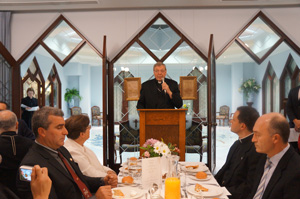
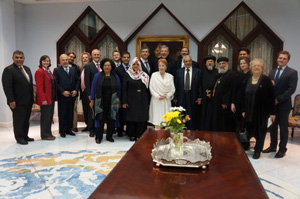
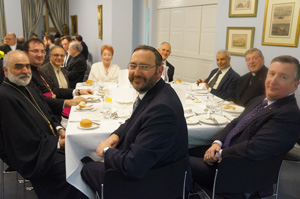
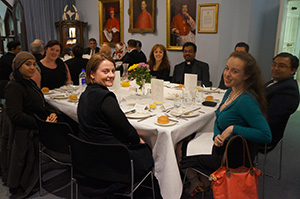
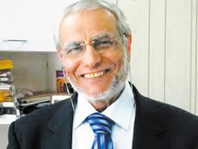
7 Aug 2013

Cardinal Pell address 70 guests at last night Iftar Dinner
Last night in what has become an annual tradition the Archbishop of Sydney, Cardinal George Pell hosted an Iftar Dinner at Cathedral House for more than 70 guests representing 15 different denominations and faiths.
Iftar refers to the evening meal when Muslims break their fast during the holy Islamic month of Ramadan and is a religious observance often shared within a community with families, friends and neighbours gathering around the table to break their fast together.
Hosted by His Eminence and held for the first time last year, the Iftar Dinner at the Cathedral is a positive sign not only of Sydney's vibrant multi-culturalism but also of a city that celebrates and respects other faith traditions.
In a world where intolerance of other faiths, beliefs and cultures is a frequent occurrence, the Cardinal's annual dinner is a way of reaching out to those of different denominations and faith traditions in mutual respect, friendship and hope for the future.
Grand Mufti and spiritual leader of Australia's Muslims, Dr Ibrahim Abu Mohammed was one of the many dignitaries and important religious leaders who were guests. Others included leaders of Islam, Judaism, Buddhism, Hinduism, Judaism together with leaders from Australia's Eastern Rite churches as well as representatives from a range of Christian denominations such as the Uniting Church, the Lutheran Church and the World Council of Churches.

The Cardinal with many of Sydney and Australia's religious leaders prior to last night's Iftar dinner
Also at the dinner were members of the Aboriginal Catholic Ministry, the Prelature of Opus Dei, the Sisters of St Joseph, the Columban Mission Institute, Sydney's Catholic Education Office, St John's College and a number of city parishes.
Sr Giovanni Farquer rsj, Executive Director of the Sydney Archdiocese's Commission for Ecumenical and Interfaith Relations who organised the dinner also welcomed Bishop Terrence Brady, Auxiliary Bishop for the Archdiocese, Supreme Court Justice His Honour Francois Kunc and Stepan Kerkyasharian, Chair of the NSW Community Relations Commission.
The evening began with a welcome to Country by Graeme Mundine, Executive Officer of Sydney's Catholic Aborginal Ministry and was followed by a reading from the Holy Qu'an and then Grace after which the meal was served.
In addressing the gathering Justice Kunc spoke about the importance of the rule of law in Australia.
"One of the basic features of the rule of law is equality before the law," he said.

Cardinal Pell (second right) and Sr Giovanni Farquer (far end of table) at last night's Iftar dinner
"That is the case for people of faith and no faith. However, the good order of our society both encourages and is enhanced by the example that our faith communities give when they demonstrate tolerance and mutual respect between themselves. Furthermore, those with views informed by religious belief are as entitled as anyone else to their place in the public square. The exercise of responsible citizenship by people living lives of integrity within their faith traditions is not only entitled to the respect of the broader society. It should also be recognised as one of the many ways that a good society is created and sustained." The judge concluded in the words of Pope Francis' message for the end of Ramadan by encouraging all present to be "true promoters of respect and friendship".
At the end of the main course, His Eminence Cardinal Pell addressed the gathering and began with a reading of Pope Francis's recent personal message to Muslims throughout the world who were celebrating the end of Ramadan this week.
"I am aware that family and social dimensions enjoy a particular prominence for Muslims during this period and it is worth noting that there are certain parallels in each of these areas with the Christian faith and practice," Pope Francis said and went on to underline the importance of education in the way Muslims and Christians understand each other and build on the foundation of mutual respect.

More than 14 different denominations and faith traditions were represented at the Archdiocese of Sydney's annual Iftar dinner
"Respect means an attitude of kindness towards people for whom we have consideration and esteem. Mutual means that his is not a one-way process but something shared by both sides," the Holy Father said and went on to explain that what Christians, Muslims and those of all faiths are called on to respect in each person is first of all his life, his physical integrity, his dignity and the rights arriving from that dignity, his reputation, his property, his ethnic and cultural identity, his ideas, and his political choices.
"We are therefore called to think, speak and write respectfully of the other, not only in his presence but always and everywhere avoiding unfair criticism or defamation. Families, schools religious teaching and all forms of media have a role to play in achieving this goal."
With regard to Muslim and Christian youth the Holy Father urged all of us to bring up our young people to think and speak respectfully of other religions and their followers and to avoid ridiculing or denigrating their convictions and practices.
Pope Francis also spoke about not only respecting other religions but urged respect for the religion's teachings, symbols and values.

Grand Mufti and spiritual leader to Australia's Muslims Dr Ibrhim Abu Mohammed responded to the Cardinal's address
"Particular respect is due to religious leaders and to places of worship. How painful are attacks on one of these!" the Holy Father said.
In past years the message to Muslims from the Vatican at the end of Ramadan has come from the Pontifical Council for Inter-religous Dialogue.
But as His Eminence told those at the dinner as this was the first year of the Holy Father's pontificate, Pope Francis had decided to sign the traditional message himself and send it as "an expression of esteem and friendship for all Muslims, especially those who are religious leaders."
The response to the address by Cardinal Pell was given by Mufti Dr Ibrahim Abu Mohammed who also spoke of the importance of education in breaking down barriers and creating understanding and fostering friendship and respect between those of all faiths.
SHARED FROM ARCHDIOCESE OF SYDNEY
TODAY'S MASS ONLINE : WED. AUG. 7, 2013
Wednesday of the Eighteenth Week in Ordinary Time
Lectionary: 409
Reading 1 NM 13:1-2, 25–14:1, 26A-29A, 34-35
The LORD said to Moses [in the desert of Paran,]
“Send men to reconnoiter the land of Canaan,
which I am giving the children of Israel.
You shall send one man from each ancestral tribe,
all of them princes.”
After reconnoitering the land for forty days they returned,
met Moses and Aaron and the whole congregation of the children of Israel
in the desert of Paran at Kadesh,
made a report to them all,
and showed the fruit of the country
to the whole congregation.
They told Moses: “We went into the land to which you sent us.
It does indeed flow with milk and honey, and here is its fruit.
However, the people who are living in the land are fierce,
and the towns are fortified and very strong.
Besides, we saw descendants of the Anakim there.
Amalekites live in the region of the Negeb;
Hittites, Jebusites, and Amorites dwell in the highlands,
and Canaanites along the seacoast and the banks of the Jordan.”
Caleb, however, to quiet the people toward Moses, said,
“We ought to go up and seize the land, for we can certainly do so.”
But the men who had gone up with him said,
“We cannot attack these people; they are too strong for us.”
So they spread discouraging reports among the children of Israel
about the land they had scouted, saying,
“The land that we explored is a country that consumes its inhabitants.
And all the people we saw there are huge, veritable giants
(the Anakim were a race of giants);
we felt like mere grasshoppers, and so we must have seemed to them.”
At this, the whole community broke out with loud cries,
and even in the night the people wailed.
The LORD said to Moses and Aaron:
“How long will this wicked assembly grumble against me?
I have heard the grumblings of the children of Israel against me.
Tell them: By my life, says the LORD,
I will do to you just what I have heard you say.
Here in the desert shall your dead bodies fall.
Forty days you spent in scouting the land;
forty years shall you suffer for your crimes:
one year for each day.
Thus you will realize what it means to oppose me.
I, the LORD, have sworn to do this
to all this wicked assembly that conspired against me:
here in the desert they shall die to the last man.”
“Send men to reconnoiter the land of Canaan,
which I am giving the children of Israel.
You shall send one man from each ancestral tribe,
all of them princes.”
After reconnoitering the land for forty days they returned,
met Moses and Aaron and the whole congregation of the children of Israel
in the desert of Paran at Kadesh,
made a report to them all,
and showed the fruit of the country
to the whole congregation.
They told Moses: “We went into the land to which you sent us.
It does indeed flow with milk and honey, and here is its fruit.
However, the people who are living in the land are fierce,
and the towns are fortified and very strong.
Besides, we saw descendants of the Anakim there.
Amalekites live in the region of the Negeb;
Hittites, Jebusites, and Amorites dwell in the highlands,
and Canaanites along the seacoast and the banks of the Jordan.”
Caleb, however, to quiet the people toward Moses, said,
“We ought to go up and seize the land, for we can certainly do so.”
But the men who had gone up with him said,
“We cannot attack these people; they are too strong for us.”
So they spread discouraging reports among the children of Israel
about the land they had scouted, saying,
“The land that we explored is a country that consumes its inhabitants.
And all the people we saw there are huge, veritable giants
(the Anakim were a race of giants);
we felt like mere grasshoppers, and so we must have seemed to them.”
At this, the whole community broke out with loud cries,
and even in the night the people wailed.
The LORD said to Moses and Aaron:
“How long will this wicked assembly grumble against me?
I have heard the grumblings of the children of Israel against me.
Tell them: By my life, says the LORD,
I will do to you just what I have heard you say.
Here in the desert shall your dead bodies fall.
Forty days you spent in scouting the land;
forty years shall you suffer for your crimes:
one year for each day.
Thus you will realize what it means to oppose me.
I, the LORD, have sworn to do this
to all this wicked assembly that conspired against me:
here in the desert they shall die to the last man.”
Responsorial Psalm PS 106:6-7AB, 13-14, 21-22, 23
R. (4a) Remember us, O Lord, as you favor your people.
We have sinned, we and our fathers;
we have committed crimes; we have done wrong.
Our fathers in Egypt
considered not your wonders.
R. Remember us, O Lord, as you favor your people.
But soon they forgot his works;
they waited not for his counsel.
They gave way to craving in the desert
and tempted God in the wilderness.
R. Remember us, O Lord, as you favor your people.
They forgot the God who had saved them,
who had done great deeds in Egypt,
Wondrous deeds in the land of Ham,
terrible things at the Red Sea.
R. Remember us, O Lord, as you favor your people.
Then he spoke of exterminating them,
but Moses, his chosen one,
Withstood him in the breach
to turn back his destructive wrath.
R. Remember us, O Lord, as you favor your people.
We have sinned, we and our fathers;
we have committed crimes; we have done wrong.
Our fathers in Egypt
considered not your wonders.
R. Remember us, O Lord, as you favor your people.
But soon they forgot his works;
they waited not for his counsel.
They gave way to craving in the desert
and tempted God in the wilderness.
R. Remember us, O Lord, as you favor your people.
They forgot the God who had saved them,
who had done great deeds in Egypt,
Wondrous deeds in the land of Ham,
terrible things at the Red Sea.
R. Remember us, O Lord, as you favor your people.
Then he spoke of exterminating them,
but Moses, his chosen one,
Withstood him in the breach
to turn back his destructive wrath.
R. Remember us, O Lord, as you favor your people.
Gospel MT 15: 21-28
At that time Jesus withdrew to the region of Tyre and Sidon.
And behold, a Canaanite woman of that district came and called out,
“Have pity on me, Lord, Son of David!
My daughter is tormented by a demon.”
But he did not say a word in answer to her.
His disciples came and asked him,
“Send her away, for she keeps calling out after us.”
He said in reply,
“I was sent only to the lost sheep of the house of Israel.”
But the woman came and did him homage, saying, “Lord, help me.”
He said in reply,
“It is not right to take the food of the children
and throw it to the dogs.”
She said, “Please, Lord, for even the dogs eat the scraps
that fall from the table of their masters.”
Then Jesus said to her in reply,
“O woman, great is your faith!
Let it be done for you as you wish.”
And her daughter was healed from that hour.
And behold, a Canaanite woman of that district came and called out,
“Have pity on me, Lord, Son of David!
My daughter is tormented by a demon.”
But he did not say a word in answer to her.
His disciples came and asked him,
“Send her away, for she keeps calling out after us.”
He said in reply,
“I was sent only to the lost sheep of the house of Israel.”
But the woman came and did him homage, saying, “Lord, help me.”
He said in reply,
“It is not right to take the food of the children
and throw it to the dogs.”
She said, “Please, Lord, for even the dogs eat the scraps
that fall from the table of their masters.”
Then Jesus said to her in reply,
“O woman, great is your faith!
Let it be done for you as you wish.”
And her daughter was healed from that hour.
TODAY'S SAINT: AUG. 7: ST. CAJETAN
FOUNDER
Feast: August 7
 Information:
|
Founder of the Theatines, born October, 1480 at Vicenza in Venetian territory; died at Naples in 1547. Under the care of a pious mother he passed a studious and exemplary youth, and took his degree as doctor utriusque juris at Padua in his twenty-fourth year. In 1506 he became at Rome a prothonotary Apostolic in the court of Julius II, and took an important share in reconciling the Republic of Venice with that pontiff. On the death of Julius in 1523 he withdrew from the court, and is credited with founding, shortly after, an association of pious priests and prelates called the Oratory of Divine Love, which spread to other Italian towns. Though remarkable for his intense love of God, he did not advance to the priesthood till 1516. Recalled to Vicenza in the following year by the death of his mother, he founded there a hospital for incurables, thus giving proof of the active charity that filled his whole life. But his zeal was more deeply moved by the spiritual diseases that, in those days of political disorder, infected the clergy of all ranks, and, like St. Augustine in earlier times, he strove to reform them by instituting a body of regular clergy, who should combine the spirit of monasticism with the exercises of the active ministry.
Returning to Rome in 1523 he laid the foundations of his new congregation, which was canonically erected by Clement VII in 1524. One of his four companions was Giovanni Pietro Caraffa, Bishop of Chieti (in Latin Theate), afterwards Paul IV, who was elected first superior, and from whose title arose the name Theatines. The order grew but slowly. During the sack of Rome in 1527 the Theatines, then twelve in number, escaped to Venice after enduring many outrages from the heretic invaders. There Cajetan met St. Hieronymus Æmiliani (see SOMASCHI), whom he assisted in the establishment of his Congregation of Clerks Regular. In 1533 Cajetan founded a house in Naples, where he was able to check the advances of Lutheranism. In 1540 he was again at Venice, whence he extended his work to Verona and Vicenza. He passed the last four years of his life, a sort of seraphic existence, at Naples where he died finally of grief at the discords of the city, suffering in his last moments a kind of mystical crucifixion. He was beatified by Urban VIII in 1629, and canonized by Clement X in 1671. His feast is kept on the 7th of August.
|
Read more: http://www.ewtn.com/saintsHoly/saints/C/stcajetan.asp#ixzz1UJRIcg32
No comments:
Post a Comment